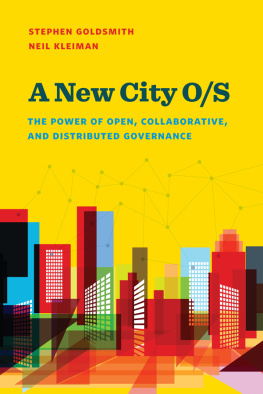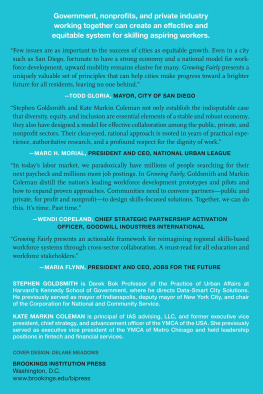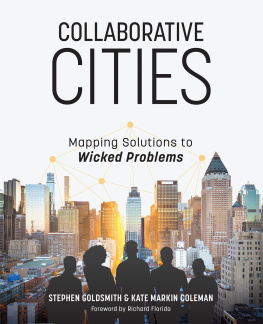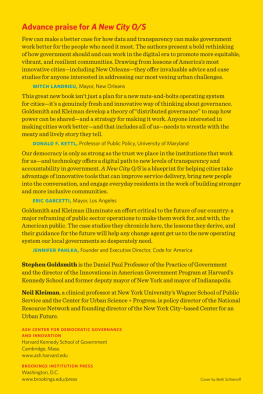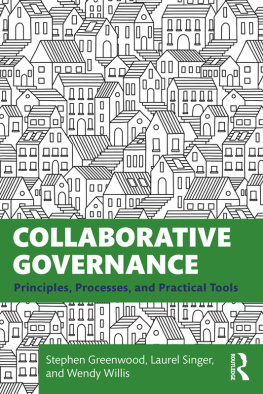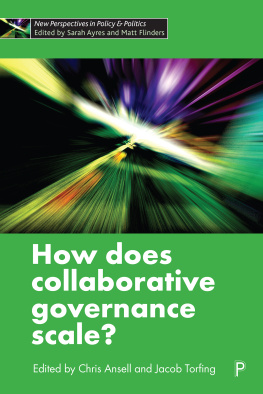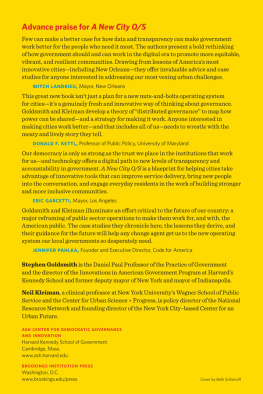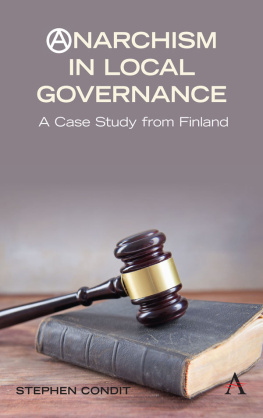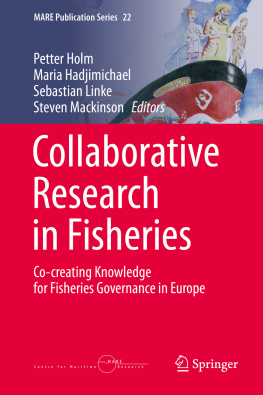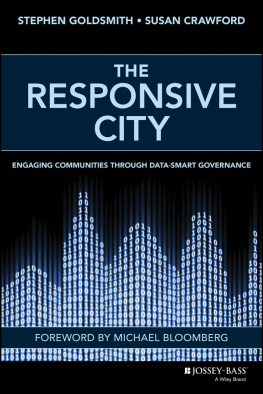Copyright 2017
Ash Center for Democratic Governance and Innovation
Harvard University
All rights reserved. No part of this publication may be reproduced or transmitted in any form or by any means without permission in writing from the Brookings Institution Press, 1775 Massachusetts Avenue, N.W., Washington, D.C. 20036, www.brookings.edu.
The Brookings Institution is a private nonprofit organization devoted to research, education, and publication on important issues of domestic and foreign policy. Its principal purpose is to bring the highest quality independent research and analysis to bear on current and emerging policy problems. Interpretations or conclusions in Brookings publications should be understood to be solely those of the authors.
Library of Congress Cataloging-in-Publication data are available.
ISBN 978-0-8157-3286-0 (pbk : alk. paper)
ISBN 978-0-8157-3287-7 (ebook)
9 8 7 6 5 4 3 2 1
Typeset in Scala
Composition by Westchester Publishing Services
Foreword
Steve Case
Each wave of internet innovation produces massive changes in societyin how people produce collective knowledge, entertain themselves, purchase goods, and form relationships. Entrepreneurial leaders, regardless of the sector in which they work, capitalize on these fundamental shifts to drive transformative improvements. But these improvements also pose new challenges: from guaranteeing the safety of autonomous vehicles to making sure new health technologies maintain patient privacy to leveraging the benefits of artificial intelligence. These are the issues the average citizen will have to face in this next wave of innovationwhat I like to call the Third Wave. And whether were ready or not, the Third Wave is here.
In this wave, the role of government will be unequivocally crucial. After all, it will be up to local governments to ensure public safety while adapting to the rapid and vast changes brought about by this new wave of innovation. And historically speaking, the public sector has largely lagged behind the private sector when it comes to embracing new technologies.
There are intriguing exceptions to that rulenew ways cities are mining data for better insights into how to run programs, for instance, and new methods of collecting that data in the first place. But as Steve Goldsmith and Neil Kleiman write in A New City O/S: The Power of Open, Collaborative, and Distributed Governance, these innovations are limited by how government is run, not empowered by it.
As the authors suggest, public officials can play an active role in ensuring that this technology wave broadly benefits quality of lifeif they can modernize the structure of government. There are many reasons why governance has trailed private markets in incorporating each wave of technological innovation. The biggest, as aptly described in this book, is that outdated structures, immune from the forces of competition, and a bureaucratic culture leave conscientious public employees unable to make service to their constituents a priority.
The Third Wave is already starting to formeven as governance has not fully embraced the opportunities of the first two waves. But that lag is exactly why local government itself is poised to be transformedthere are many, many opportunities for massive change. Officials who follow the lessons in A New City O/S can ride this wave of technological change instead of becoming overwhelmed by it.
When I first met Steve Goldsmith in 1999, he was fascinated by the evolution of AOL from a set of pipes, so to speak, to an aggregator of content designed to improve peoples quality of life and break down boundariesgeographic or otherwisethat prevented people with common interests from coming together in everyday life. As mayor of Indianapolis, Steve had been an early advocate of providing city services via the internet, and in 1996, he helped the city become one of the first in the country to make e-government and online delivery of city services a reality.
Several years later, when Steve was chairman of the federal Corporation for National and Community Service (CNCS), he met with my wife, Jean, CEO of the Case Foundation, and again sought ideas centered around the second wave of internet innovation. Jean, as chair of the Presidents Council on Service and Civic Participation, and I worked with Steve to broaden the ways in which individuals could organize to serve their communities, and the Case Foundation helped CNCS take advantage of social media to engage people in volunteer service. As a result, well before social platforms had obtained much traction in leveraging public goods, CNCS partnered with Facebook to use social media marketing to recruit volunteers for the Martin Luther King Day of Service, coinciding with the day of President Obamas inauguration. The number of volunteers increased fourfold over previous years, soaring to almost 100,000.
Today, the idea of using social media to drive support is commonplace, and yet were still only on the cusp of what the smartphone revolution can do for local government. Whats more, new technologies are continually coming online. Sensor data from wearables, street lights, water pipes, mobile phones, and buildings, for instance, are only part of that Third Wave, and it will give city employeesfrom health inspectors to urban plannersmore and better information than they ever dreamed.
The public sector can learn from the private sector, but it is uniquely different, with its own opportunities and challenges, history, and future. Yet both citizens and the government employees who serve them are frustrated. Citizens see what a responsive large private enterprise can produce for them by capturing the benefits of these waves of technological innovations. However, they dont see similar public breakthroughs. That means they become less trustful of their government, and less willing to become involved or support its programs with tax dollars, voices, and civic participation.
With the potential of these new technologies and platforms for engagement and using data to pre-emptively solve problems, government can produce what A New City O/S nicely describes as distributed and collaborative governance that allows public officials to mobilize new resources, surface ideas from unconventional sources, and arm employees with the information they need to become pre-emptive problem solvers.
The ubiquitous connectivity of the Third Wave will result in breakthroughs no longer produced by a single doctor or researcher, but rather by social interaction with well-curated learning. By moving beyond governments older structures and very tight hierarchies, this model of distributed governance allows employees to both unleash their entrepreneurial spirit and to work across departments with more information and a wider field of partnersincluding for-profit businesses, universities, philanthropies, and nonprofits. I often cite an African proverb, If you want to go fast, go alone. If you want to go far, go together. Partnerships will likely never be more important than they are in this next wave of technological progress.
The New O/S captures two principles long important to any work, but particularly useful for government officials:

